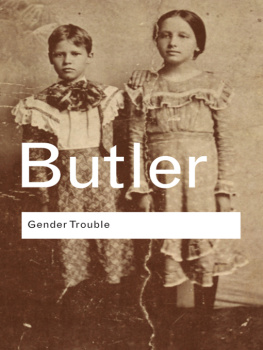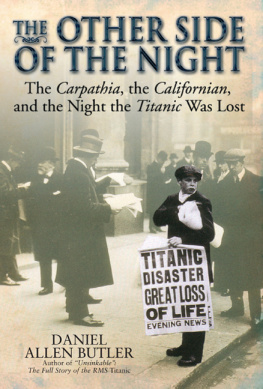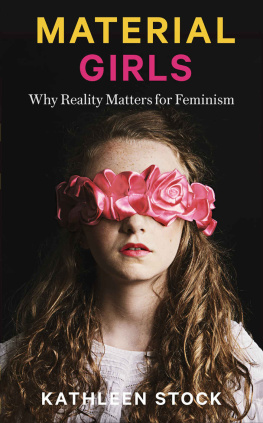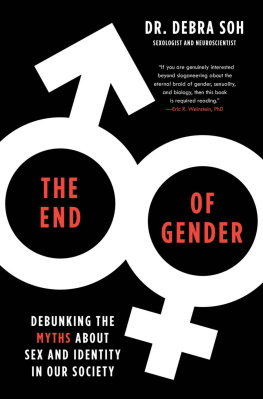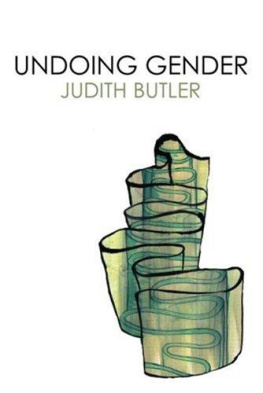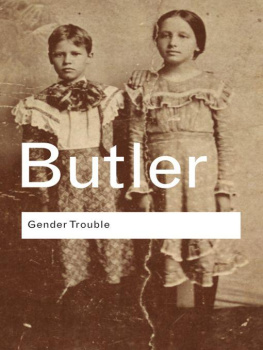Gender Trouble
Gender Trouble is a classic in the best sense: rereading this book, as well as reading it for the first time, reshapes the categories through which we experience and perform our lives and bodies. To be troubled in this way is an intellectual pleasure and a political necessity. Butlers lucid, witty and very smart classic is more than critique of gender-making apparatuses; it is generative of possibilities for promising monsters who may yet reconfigure what can count as natural.
Donna Haraway
The most authoritative attack to date on the naturalness of gender. This is a brilliant and innovative book.
Sandra Lee Bartky
Indispensable for feminist theory.
Hypatia
At times brilliant, always groundbreaking, Gender Trouble is bound to make some trouble of its own.
Outweek
A tremendously sophisticated and well-argued book, a very exciting read.
Women and Politics
Routledge Classics contains the very best of Routledge publishing over the past century or so, books that have, by popular consent, become established as classics in their field. Drawing on a fantastic heritage of innovative writing published by Routledge and its associated imprints, this series makes available in attractive, affordable form some of the most important works of modern times.
For a complete list of titles visit
www.routledge.com/classics
1
SUBJECTS OF SEX/
GENDER/DESIRE
One is not born a woman, but rather becomes one.
Simone de Beauvoir
Strictly speaking, women cannot be said to exist.
Julia Kristeva
Woman does not have a sex.
Luce Irigaray
The deployment of sexuality established this notion of sex.
Michel Foucault
The category of sex is the political category that founds society as heterosexual.
Monique Wittig
I. WOMEN AS THE SUBJECT OF FEMINISM
For the most part, feminist theory has assumed that there is some existing identity, understood through the category of women, who not only initiates feminist interests and goals within discourse, but constitutes the subject for whom political representation is pursued. But politics and representation are controversial terms. On the one hand, representation serves as the operative term within a political process that seeks to extend visibility and legitimacy to women as political subjects; on the other hand, representation is the normative function of a language which is said either to reveal or to distort what is assumed to be true about the category of women. For feminist theory, the development of a language that fully or adequately represents women has seemed necessary to foster the political visibility of women. This has seemed obviously important considering the pervasive cultural condition in which womens lives were either misrepresented or not represented at all.
Recently, this prevailing conception of the relation between feminist theory and politics has come under challenge from within feminist discourse. The very subject of women is no longer understood in stable or abiding terms. There is a great deal of material that not only questions the viability of the subject as the ultimate candidate for representation or, indeed, liberation, but there is very little agreement after all on what it is that constitutes, or ought to constitute, the category of women. The domains of political and linguistic representation set out in advance the criterion by which subjects themselves are formed, with the result that representation is extended only to what can be acknowledged as a subject. In other words, the qualifications for being a subject must first be met before representation can be extended.
Foucault points out that juridical systems of power produce the subjects they subsequently come to represent.of power appear to regulate political life in purely negative termsthat is, through the limitation, prohibition, regulation, control, and even protection of individuals related to that political structure through the contingent and retractable operation of choice. But the subjects regulated by such structures are, by virtue of being subjected to them, formed, defined, and reproduced in accordance with the requirements of those structures. If this analysis is right, then the juridical formation of language and politics that represents women as the subject of feminism is itself a discursive formation and effect of a given version of representational politics. And the feminist subject turns out to be discursively constituted by the very political system that is supposed to facilitate its emancipation. This becomes politically problematic if that system can be shown to produce gendered subjects along a differential axis of domination or to produce subjects who are presumed to be masculine. In such cases, an uncritical appeal to such a system for the emancipation of women will be clearly self-defeating.
The question of the subject is crucial for politics, and for feminist politics in particular, because juridical subjects are invariably produced through certain exclusionary practices that do not show once the juridical structure of politics has been established. In other words, the political construction of the subject proceeds with certain legitimating and exclusionary aims, and these political operations are effectively concealed and naturalized by a political analysis that takes juridical structures as their foundation. Juridical power inevitably produces what it claims merely to represent; hence, politics must be concerned with this dual function of power: the juridical and the productive. In effect, the law produces and then conceals the notion of a subject before the lawfully represented in language and politics. Feminist critique ought also to understand how the category of women, the subject of feminism, is produced and restrained by the very structures of power through which emancipation is sought.
Indeed, the question of women as the subject of feminism raises the possibility that there may not be a subject who stands before the law, awaiting representation in or by the law. Perhaps the subject, as well as the invocation of a temporal before, is constituted by the law as the fictive foundation of its own claim to legitimacy. The prevailing assumption of the ontological integrity of the subject before the law might be understood as the contemporary trace of the state of nature hypothesis, that foundationalist fable constitutive of the juridical structures of classical liberalism. The performative invocation of a nonhistorical before becomes the foundational premise that guarantees a presocial ontology of persons who freely consent to be governed and, thereby, constitute the legitimacy of the social contract.
Apart from the foundationalist fictions that support the notion of the subject, however, there is the political problem that feminism encounters in the assumption that the term women denotes a common identity. Rather than a stable signifier that commands the assent of those whom it purports to describe and represent, women , even in the plural, has become a troublesome term, a site of contest, a cause for anxiety. As Denise Rileys title suggests, Am I That Name? is a question produced by the very possibility of the names multiple significations.and cultural intersections in which it is invariably produced and maintained.
The political assumption that there must be a universal basis for feminism, one which must be found in an identity assumed to exist cross-culturally, often accompanies the notion that the oppression of women has some singular form discernible in the universal or hegemonic structure of patriarchy or masculine domination. The notion of a universal patriarchy has been widely criticized in recent years for its failure to account for the workings of gender oppression in the concrete cultural contexts in which it exists. Where those various contexts have been consulted within such theories, it has been to find examples or illustrations of a universal principle that is assumed from the start. That form of feminist theorizing has come under criticism for its efforts to colonize and appropriate non-Western cultures to support highly Western notions of oppression, but because they tend as well to construct a Third World or even an Orient in which gender oppression is subtly explained as symptomatic of an essential, non-Western barbarism. The urgency of feminism to establish a universal status for patriarchy in order to strengthen the appearance of feminisms own claims to be representative has occasionally motivated the shortcut to a categorial or fictive universality of the structure of domination, held to produce womens common subjugated experience.

